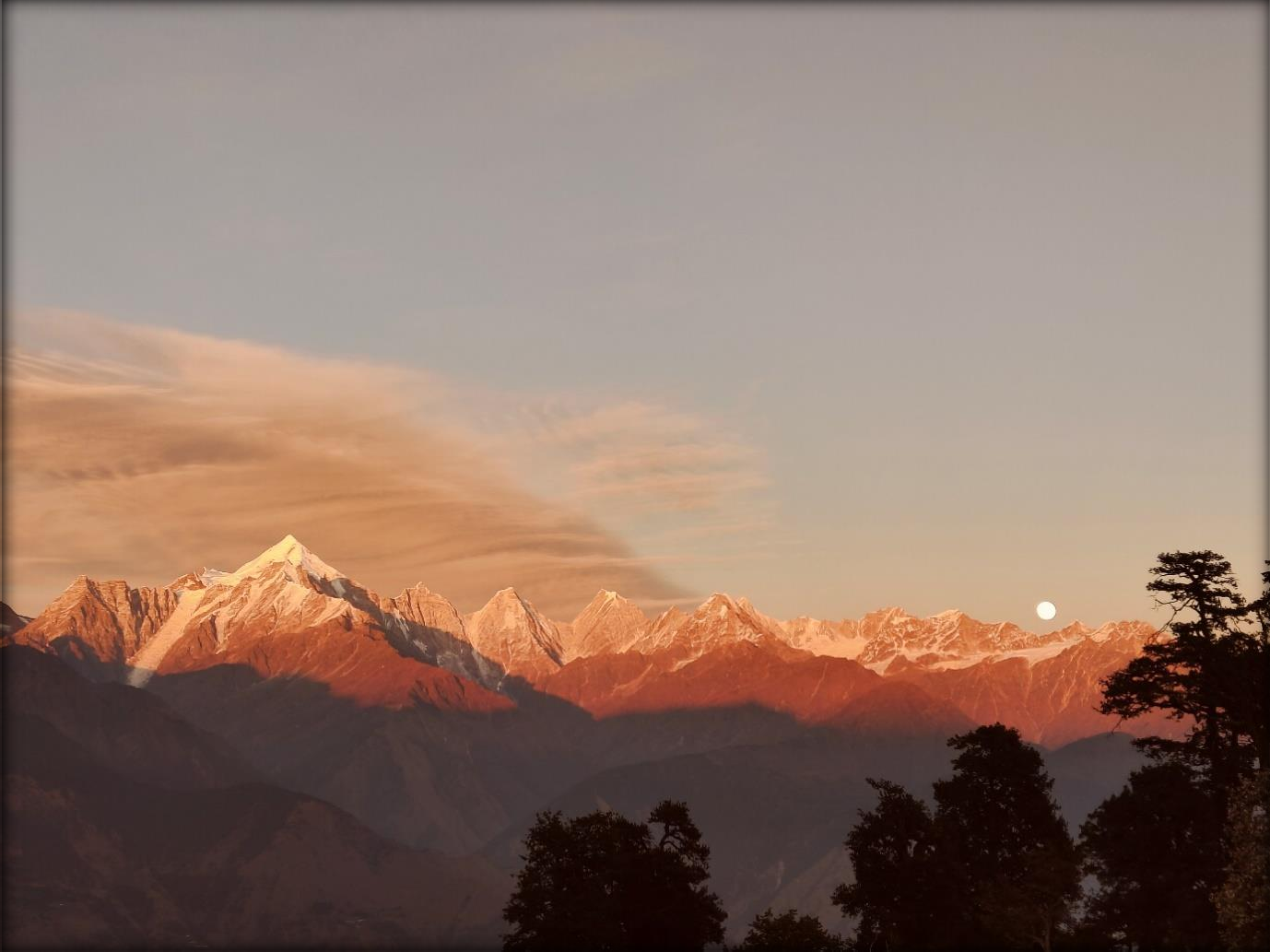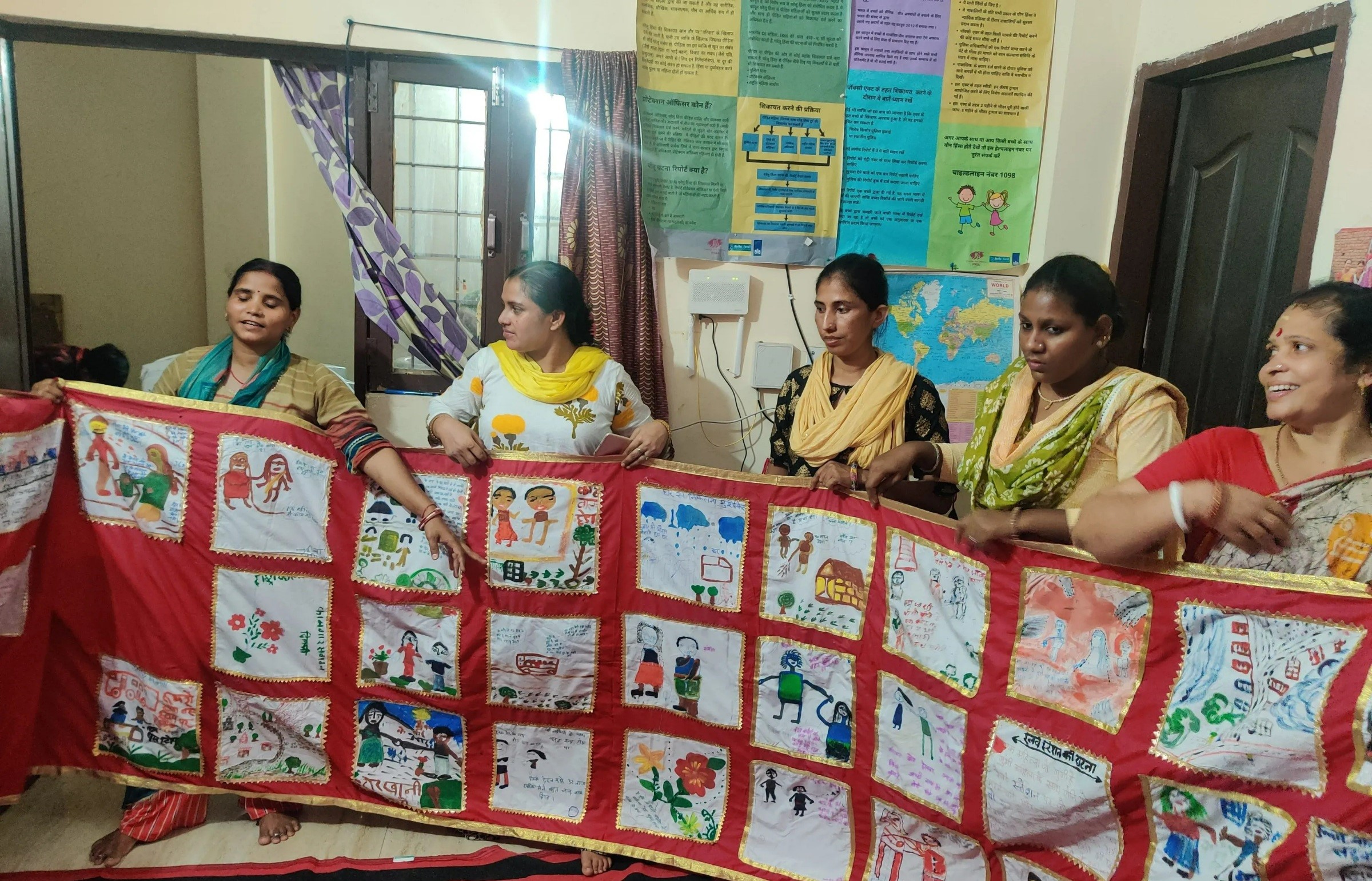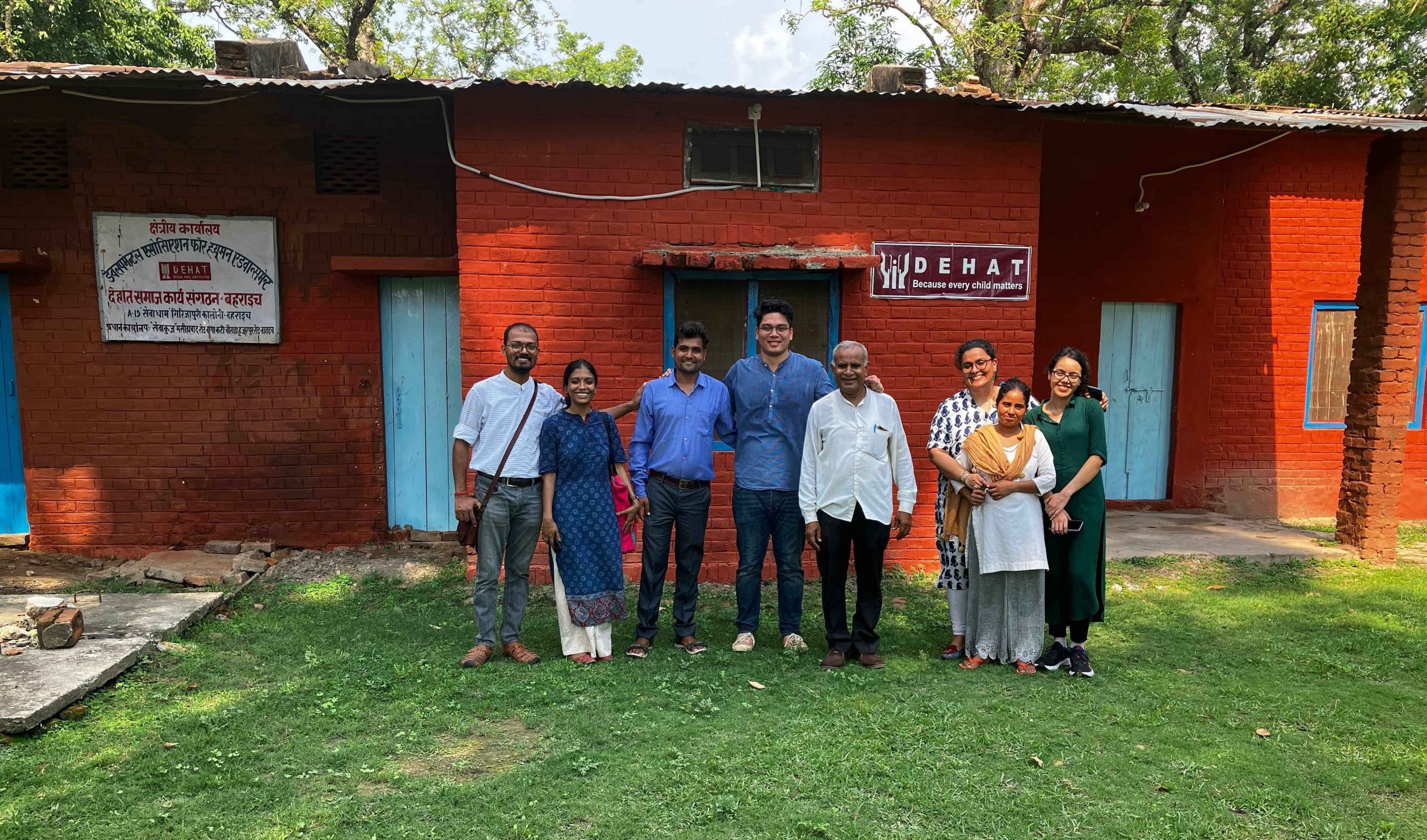Uttarakhand, located in the Himalayan foothills, has a diverse landscape, including forests, terraced agricultural fields, soaring mountain ranges, and deep river valleys. Kumaon, one of its key regions, is home to communities like the Kumaonis, Bhotiyas, and Rajis, who have long adapted to this rugged geography through agriculture, pastoralism, and traditional crafts such as wood-carving, painting and decorative items.
With forests covering 65% of Uttarakhand’s land, the state is a hub for non-timber forest products (NTFPs), particularly medicinal and aromatic plants (MAPs). These resources hold immense economic and traditional value, especially in Ayurveda. Initiatives to promote sustainable MAP cultivation and eco-tourism, aim to boost rural livelihoods but have not been implemented due to unforeseen circumstances.
In many Kumaon districts, women form the backbone of local life, especially as men migrate in search of work. They play vital roles in farming, household management, and community sustenance. However, their access to education, healthcare, and economic opportunities remains limited due to mountainous terrain and the long distances to essential services. The NFHS-5 data reveals that only 27% of women aged 15-49 in Uttarakhand were employed in the year preceding the survey, compared to 75% of men. Among working women, 80% earned cash, but 19% were unpaid. Women dominate non-agricultural sectors (88%), like men (83%). Encouragingly, 93% of married working women report joint or sole decision-making power over their earnings, and 32% earn as much as or more than their husbands.
Despite their critical roles, female labour-force participation in Uttarakhand has declined significantly. Contributing factors include mechanization of agriculture, and the burdens of unpaid care work. Solutions lie in creating more jobs for women in non-farm sectors, offering skilling programs, and addressing care-related barriers. Expanding platform-based work could also help reintegrate women into the workforce and in key-decision making.
This is where the Association for Rural Planning and Action (ARPAN), founded by Renu Thakur in 1997, plays a significant role. Based in Askot, Pithoragarh, at the trijunction of Nepal and Tibet, ARPAN’s vision focuses on building community leadership by strengthening local groups and providing leadership training to both community members and its team. Early on, ARPAN worked towards the social inclusion of women and environmental conservation, successfully halting the quarrying of land along the Kali Nadi and promoting the efforts for land conservation in the Askot Musk Deer Sanctuary. The organization also played a key role in preserving 300 square kilometres of land, which would have been submerged by the Pancheshwar Dam, safeguarding the ancestral lands of the Raji Tribe—the only Particularly Vulnerable Tribal Group (PVTG) in the region with a diminishing population of 1,074 individuals. From 2000 onwards, ARPAN expanded its focus to include children while keeping women at the heart of its work.
ARPAN set up Balwadi centres to provide care and early childhood education for the children of working mothers. Over time, ARPAN also worked on addressing issues of domestic violence, particularly related to alcoholism, while supporting women in gaining access to land and participating in government schemes like MGNREGA (Mahatma Gandhi National Rural Employment Guarantee Act). ARPAN’s work currently covers a range of areas, including working with elected women representatives in Panchayats, supporting land access for women, assisting marginalized communities such as the Raji and Dalit tribes, and continuing efforts to address violence against women.

Access to land and economic inclusion:
ARPAN has long been dedicated to addressing the critical issue of land rights for women, especially single women, in a society where land ownership and control are largely in the hands of men. In rural areas, around 90% of women are involved in agriculture and animal care, yet the financial benefits from land ownership—such as pensions and government subsidies—are typically directed toward male landowners. ARPAN’s work seeks to tackle these challenges head-on by empowering women and helping them secure their land rights.
An internal survey conducted by ARPAN with close to 200 women highlighted that 61 women, particularly single women, lack the necessary access to land rights and government schemes due to their exclusion from land ownership records. This systemic inequality is even more pronounced for single women, who often face extreme economic hardship due to their exclusion from land ownership and access to associated benefits.
One of ARPAN’s key initiatives focuses on raising awareness and empowering women to achieve the status of a ‘farmer’. This is a crucial step in securing their land rights and accessing a variety of government schemes that support agricultural activities. Through awareness programs, ARPAN helps women understand the importance of having legal rights over their land. They are also guided through the bureaucratic processes necessary to secure these rights. The first key step in this process is registering women under the Pradhan Mantri Kisan Samman Nidhi Yojana (PM-KISAN) and obtaining an Antodaya card (job card). This initiative provides women with an annual income of ₹6,000, paid in ₹500 monthly instalments. Additionally, women can access agricultural loans ranging from ₹50,000 to ₹1,00,000 at a low interest rate of 2-3%. In comparison, loans taken from other sources often carry much higher interest rates of up to 12%. These loans help women invest in agricultural resources, while they also become eligible for a Kisan Credit Card, which allows them to purchase tractors and other farming equipment at subsidized rates. Subsidies are also available for seeds and fertilizers, providing women with the tools they need to improve their agricultural productivity.

The process of securing land rights involves gathering essential documentation. For agricultural land, verifying ownership is key, which is typically done by checking the revenue record. Important documents include the Khata, Khatoni, or Khasra, which detail land ownership, and the Title Deed, which can be requested from the seller. Other supporting documents, such as the Assessment Register Ledger (or Khata), also confirm ownership. The entire process of verifying and collecting the necessary documents generally takes 2-3 months.
Women as change-makers:
In addition to direct interventions, ARPAN has established Mahila Samuhs (women’s self-help groups) to provide a platform for women to meet, share their experiences, and address systemic barriers collectively. These groups serve not only as support systems but also as a means for women to engage in solutions for issues such as water access, healthcare, and education. Through these groups, ARPAN ensures that women are not just passive participants but also community leaders, driving social and economic change.
One success story is the Mahila Kissan Samuh in Birkhim, led by Urmila, a ward member. Initially started by ARPAN, this self-sustaining group now manages a seed bank, a goat bank, and a vermicomposting unit. The group facilitates market linkages and promotes sustainable agricultural practices, focusing on preserving traditional knowledge of seeds. It also plays an active role in local issues such as water scarcity, advocating for change with the Panchayat and, when necessary, escalating the matter to the police.

The Mahila Samuhs, through their Self-Help Groups (SHGs), are linked to the National Rural Livelihood Mission (NRLM), which helps women access government schemes to enhance their livelihoods. These SHGs offer a platform for women to pool resources, share knowledge, and achieve financial independence. Each member contributes ₹200 per month, creating a collective fund that
enables the group to access loans at an interest rate of 5%. These loans are essential for women to invest in farming, and livestock which enhances their economic resilience.
While some Mahila Samuhs, like those in Birkhim, have become self-sustaining, others continue to face significant challenges. In the village of Dhaniya Khan primarily resided by the Dalit community, women, due to a lack of awareness, often sign land transfer agreements with a validity of only three months, resulting in the loss of cases in court due to legal complications. High divorce rates and domestic violence continue to affect many families, with 2-3 women per 20-30 households experiencing divorce.
Despite these challenges, the Mahila Samuhs provide a critical platform for these women to voice their concerns and advocate for their needs. Another example of successful empowerment is seen in the leadership of Santoshi Devi (Uppradhan) and Jyoti (Adhyaksh) in Sitola, where they have successfully halted child marriages and tackled community issues such as inadequate infrastructure and water shortages, especially in schools, which makes it particularly difficult for young girls. Despite the ongoing challenges, the Mahila Samuhs have proven to be powerful tools for collective action, raising awareness and pushing for positive change.
Shifting power dynamics:
A typical day for the women ARPAN works with begins early in the morning, often starting with household chores such as cooking, cleaning, and fetching water. Many women also participate in agricultural activities, tending to crop, managing livestock, or preparing land for sowing. In the afternoon, they engage in cutting grass, washing vessels and the workday concludes with evening chores or helping their children with their education.
The COVID-19 pandemic has significantly reshaped gender roles in rural communities. With many men migrating to cities in search of work, women have stepped into the role of primary earners in numerous households. This shift has given women confidence, granting them greater control over their financial independence and household decisions. As a result, their role in reshaping both their families and communities has grown, leading to long-lasting impacts on their empowerment.

Leading from the forefront:
ARPAN believes in the power of collectivization but more so in driving change by encouraging women to take on leadership positions. One such example is Hema, the Pradhan (village head) of Ghimali Gram Panchayat, whose journey highlights the impact of women in leadership.
When Hema first assumed the role of Pradhan, she struggled to find her voice. Appointed through the women’s reservation policy, she initially took a backseat in meetings. However, the creation of the Mahila Jagruk Manch by ARPAN—an exclusive platform for women to voice their concerns—was a turning point. This initiative boosted Hema’s confidence and leadership skills, encouraging her to step forward and address the pressing issues in her community.
Hema soon recognized the pressing challenges in her village, including poor infrastructure and widespread alcoholism. Over time, her efforts gained support from local women. Although Hema initially faced resistance from her husband, she remained committed to her leadership role, asking, “Am I wrong in wanting to improve the village?” Eventually, her in-laws began to support her, and Hema was able to balance her duties as Pradhan with her responsibilities at home, with help from her children.
The pandemic presented additional challenges, but it also reinforced Hema’s commitment to her community. She regularly travelled to Askot, where ARPAN offered training on government schemes, which helped her better serve the people of Ghimali. Recognizing the livelihood difficulties faced by single women in her ward, Hema donated her tailoring machine to help them generate income. Despite her best efforts, Hema’s tenure has not been without difficulties. The transition to an online system for direct benefit transfers to job card holders have caused delays. To help those affected, Hema has stepped in, using her own resources to provide interim support while awaiting official disbursements.
Despite these challenges, Hema’s dedication to her role as Pradhan has made a lasting impact, on the village but also on her development, where now she wants women to come forward and take on more leadership positions.

Unlocking the potential of flexible funding and co-partnership:
Unrestricted funding has been a game-changer for ARPAN, allowing the organization to address critical needs and explore new opportunities. The funding has supported the hiring of additional staff, enhanced capacity-building initiatives, and enabled the piloting of innovative programs focused on addressing unique community challenges, particularly single women’s land rights. It has also helped bridge gaps in staff remuneration and supported community disaster relief efforts. Additionally, ARPAN used the Rebuild Fund to prioritize staff well-being, organizing a recreational trip to Munsiyari in Uttarakhand.
The Rebuild team facilitated capacity-building sessions for ARPAN, focusing on Measurement, Learning, and Evaluation (MLE) and Communications. The MLE session covered foundational concepts, the components of an effective MLE framework, and a hands-on activity for developing program indicators. In the Communications workshop, the emphasis was on crafting compelling case studies, identifying their essential elements, and streamlining reports such as meeting minutes.

Team members, including Ganga, Priyanka, and Vinod, led group activities to design indicators for various programs. These were shared collectively, contributing to knowledge-building, exchange and collaboration.
ARPAN’s greatest strength lies in its dedicated team, including Ganga, Neha, Priyanka, Vinod, and Vijay, many of whom have been with the organization since its inception. Their unwavering commitment, particularly during the COVID-19 pandemic, demonstrated their resilience as they addressed community needs despite personal risks. This spirit continues to drive ARPAN’s impactful work.
What truly sets ARPAN apart is its community-rooted staff. The team, largely drawn from the communities it serves, has a unique understanding of the challenges and evolving needs on the ground.
This deep connection ensures that ARPAN delivers tailored, impactful support to those who need it most.




